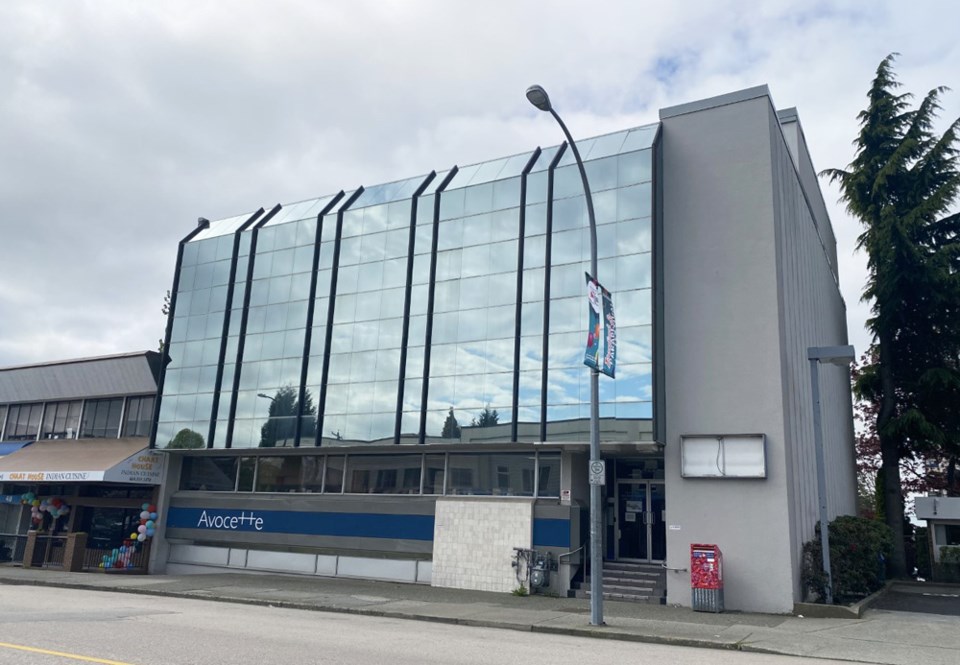Plans for a supportive housing project on Sixth Street are moving ahead after New Westminster city council gave three readings to a zoning amendment bylaw on Monday night.
The Lower Mainland Purpose Society is proposing to create up to 30 housing units for people who are at risk of or are experiencing homelessness. The proposal is to allow supportive housing on the top two floors of the existing four-storey commercial building at 422 Sixth St., with 24/7 staff support and catering services provided on-site.
Following a lengthy and often contentious discussion at their June 26 meeting, councillors voted in favour of having staff work with Purpose Society to draw up a Good Neighbour Agreement and come up with the terms of reference for a community advisory committee for the facility.
Councillors were split along party lines over whether that Good Neighbour Agreement should be a voluntary agreement — as is the city’s current practice — or whether it should be a formal agreement tied to the organization’s business licence.
The two New West Progressives councillors, Daniel Fontaine and Paul Minhas, argued in favour of tying the Good Neighbour Agreement to the business licence.
Fontaine questioned how the city could enforce a voluntary agreement.
“We need the Good Neighbour Agreement to work, and we need this project to work for the community, and we need to take the time to get it right,” he said. “Because if we don’t get it right tonight, you won’t be able to fix it.”
Fontaine said tying the agreement to issuance of a business licence would provide some comfort to neighbours after what he characterized as a “rushed” public input process.
Fontaine and Minhas put forward numerous proposed amendments to the agreement, including a suggestion by Minhas that the business licence to operate the property be reviewed if there are six or more infractions to the agreement within a 12-month period.
“I won’t support this. Where would these people go? They would lose their housing,” Coun. Nadine Nakagawa objected. “We are borrowing so much trouble here. We are presupposing so much about this type of housing. This is just a recipe for stigma, and I don’t support it.”
Also prompting objections from Nakagawa and her Community First New West colleagues was a proposed amendment by Minhas that called for 24-hour security at the facility.
Mayor Patrick Johnstone said the suggestion wasn’t in keeping with the idea of Good Neighbour Agreements being voluntary and based on mutual respect.
“I find the idea of us requiring 24-7 security inside people’s homes abhorrent,” he said. “People living in affordable housing are not criminals and should not be criminalized and should not be treated as people who can’t be trusted to live in their own homes without security.”
In the end, Minhas’ and Fontaine’s motions were voted down 5-2, with Nakagawa, Johnstone, Jaimie McEvoy, Ruby Campbell and Tasha Henderson voting against them.
One of Fontaine’s amendments — that minutes of the community advisory committee meetings be available to council members on request — did pass.
Councillors spoke to the importance of the project in helping the city to meet its goals around affordable housing.
“I believe community is expecting us to find safe, supportive ways to house people,” said Campbell. “And we have a housing crisis; I think community is expecting us to deal with that.”
Fontaine, however, said it was unfair to suggest that objections to the process indicated an opposition to affordable housing.
“I don’t believe there’s anybody in this chamber that doesn’t want more affordable housing,” he said. “I don’t think there’s anybody that doesn’t want to be able to get people off the street and into housing. That does not mean that we don’t have a duty to make sure that we have the best Good Neighbour Agreement that we can negotiate.”
In the end, the related zoning amendment bylaw that paves the way for the facility received third reading by unanimous vote.





